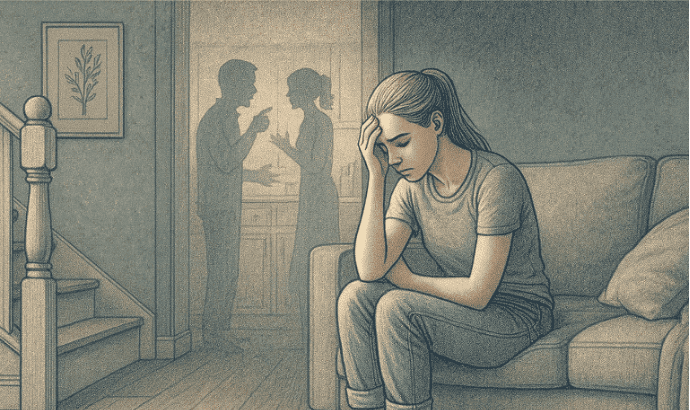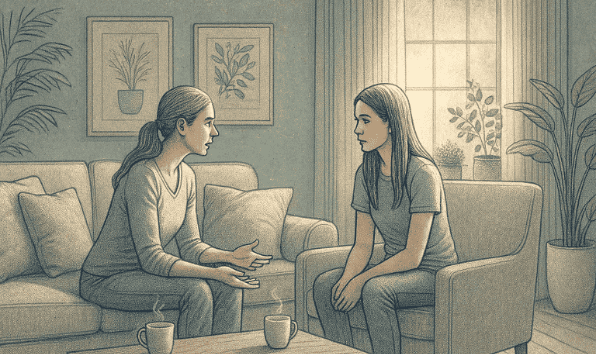Key Takeaways
- It’s normal for teens to have mood swings and periods of sadness, since their brains are still developing and they face intense emotions tied to friendships, school, and family life.
- Depression is different from normal teen emotions, as it brings persistent sadness, hopelessness, and changes in sleep, appetite, or social behavior that last for weeks or months.
- The main difference lies in duration and impact; normal sadness fades with time, but depression interferes with daily life, relationships, and a teen’s ability to function.
- Recognizing the signs early helps families provide the right support, whether that’s open communication at home, building resilience through healthy routines, or seeking professional treatment when emotions go beyond normal struggles.
- Mission Prep Healthcare offers comprehensive therapeutic programs that help teens develop emotional regulation skills and healthy coping strategies while supporting families through the healing process.
Understanding the Difference Between Normal Teen Emotions and Depression
Teenagers naturally experience intense emotions as part of healthy development. The adolescent brain is still forming connections related to emotional regulation, making mood swings, occasional sadness, and heightened reactions completely normal. Most teens will have days when they feel overwhelmed, frustrated, or sad about friendships, school pressures, or family situations.
However, depression in teenagers goes beyond these typical emotional fluctuations. While normal teenage sadness tends to be situational and temporary, teen depression involves persistent feelings that interfere with daily life. A teen might feel sad after a breakup for a few weeks, but depression creates a lasting sense of hopelessness that colors every aspect of their experience.
The challenge for parents is recognizing when their teen’s emotional struggles have moved beyond normal development into something that needs professional attention. Understanding this distinction helps families respond appropriately and get support when it’s truly needed.
Mission Prep Healthcare specializes in mental health treatment for teens aged 12-17, offering residential and outpatient programs for anxiety, depression, trauma, and mood disorders. Our therapies include CBT, DBT, EMDR, and TMS, tailored to each adolescent’s needs.
With a structured, supportive environment, we integrate academic support and family involvement to promote lasting recovery. Our goal is to help teens build resilience and regain confidence in their future.
Common Signs That Go Beyond Normal Teen Struggles

Teen depression often manifests as losing interest in once-beloved hobbies like music, sports, and creative activities that previously brought joy and satisfaction.
Persistent Mood Changes
Depression in teens often shows up as ongoing sadness, irritability, or emptiness that lasts for weeks or months. Unlike temporary disappointment or frustration, these feelings seem to persist regardless of circumstances. Your teen might seem sad even during activities they normally enjoy or become irritable over small things that wouldn’t have bothered them before.
Loss of Interest in Previously Enjoyed Activities
When teens lose interest in hobbies, sports, or social activities they once loved, it can signal depression. This goes beyond being “too cool” for certain activities. Instead, they genuinely seem to have lost the ability to experience joy or satisfaction from things that used to bring them pleasure.
Changes in Sleep and Appetite
Depression can dramatically alter sleep patterns and eating habits. Some teens sleep excessively, using sleep as an escape, while others experience insomnia. Similarly, appetite changes might involve eating much more or much less than usual, often without conscious awareness of these shifts.
Social Withdrawal
While some social changes are normal during adolescence, depression-related withdrawal is more extreme. Teens might isolate themselves from family and friends, avoid social situations entirely, or seem emotionally disconnected even when physically present.
Why Some Teens Experience Depression
Hormonal and Brain Development Factors
The teenage brain undergoes significant changes, particularly in areas responsible for emotional regulation and decision-making. These developmental processes, combined with hormonal fluctuations, can make teens more vulnerable to emotional difficulties. The prefrontal cortex, which helps manage emotions and impulses, isn’t fully developed until the mid-twenties.
Social and Academic Pressures
Today’s teens face unprecedented pressures from social media, academic competition, and future planning. The constant comparison with others online, pressure to excel academically, and anxiety about college and career choices can feel overwhelming. These stressors can trigger depression in teens who don’t yet have fully developed coping mechanisms.
Family and Environmental Influences
Family conflict, financial stress, major life changes, or traumatic experiences can contribute to teen depression. Additionally, teens who have family histories of depression may be more susceptible. Environmental factors like bullying, discrimination, or chronic stress at home or school also play important roles.

Environmental and family stressors can significantly impact a teenager’s emotional well-being and contribute to depressive symptoms.
When Teen Sadness Becomes Something More Serious
The key factors that distinguish depression from normal teenage emotions are duration, intensity, and impact on functioning. Normal sadness tends to be connected to specific events and improves over time. Depression, however, persists for weeks or months and affects multiple areas of life.
Look for changes in your teen’s ability to function at school, maintain relationships, or take care of basic needs. When sadness begins interfering with sleep, eating, academic performance, or social connections, it’s likely moved beyond normal teenage struggles.
Another important indicator is if your teen can still experience moments of joy or connection. While normal sadness allows for good moments mixed with difficult ones, depression often creates a persistent gray feeling that seems to touch everything.
Supporting Your Teen Through Difficult Emotions
Creating Open Communication
Make yourself emotionally available without being intrusive. Regular, low-pressure conversations during car rides or while doing activities together can create natural opportunities for your teen to share what they’re experiencing. Listen without immediately trying to fix or minimize their feelings.
Validating Their Feelings
Avoid dismissing your teen’s emotions as “just a phase” or comparing their problems to others’. Acknowledge that their feelings are real and important, even if the situations causing them seem minor from an adult perspective. Validation helps teens feel heard and supported.
Maintaining Routines and Connection
Gentle consistency helps teens feel grounded during emotional turbulence. Maintain family routines, shared meals, and regular check-ins while being flexible about your teen’s changing needs. Connection doesn’t require deep conversations; sometimes just being present and available matters most.
Building Emotional Resilience in Teenagers
Teaching Coping Strategies
Help your teen develop healthy ways to manage difficult emotions. This might include deep breathing exercises, journaling, physical activity, or creative outlets. The goal is building a toolkit of strategies they can use when feeling overwhelmed.
Encouraging Healthy Activities
Physical activity, adequate sleep, and time in nature can significantly impact mood and emotional regulation. Encourage these activities without making them feel like prescribed medicine. Instead, participate together when possible and model healthy habits yourself.
When to Seek Professional Help
If your teen’s sadness persists for more than a few weeks, interferes with their daily functioning, or includes concerning thoughts about self-harm, professional help is essential. Other red flags include dramatic changes in personality, declining academic performance, loss of friendships, or expressions of hopelessness about the future.
Professional therapy provides teens with specialized tools for managing depression and building emotional resilience. Therapists trained in adolescent mental health can help teens understand their emotions, develop coping strategies, and work through underlying issues contributing to their depression.
Family therapy can also address communication patterns and family dynamics that may be contributing to your teen’s struggles while helping everyone develop healthier ways of supporting each other.
Why Mission Prep is Your Partner for Teen Depression

Mission Prep’s therapeutic programs create safe, supportive environments where teens can explore their emotions and develop healthy coping strategies.
When your teenager is struggling with depression, Mission Prep Healthcare offers comprehensive therapeutic programs specifically designed for adolescents ages 12 to 17. Our approach recognizes that teen depression requires a specialized understanding of adolescent development and family dynamics.
Our experienced clinical team uses evidence-based therapeutic approaches, including cognitive behavioral therapy, dialectical behavior therapy, and family-focused interventions to help teens develop emotional regulation skills and healthy coping strategies. We understand that depression in teenagers often involves complex factors requiring individualized treatment approaches.
What sets Mission Prep apart is our commitment to treating the whole family system. We provide parents with tools and strategies for supporting their teen’s recovery while addressing family communication patterns and dynamics that can impact healing. Our residential, outpatient, and telehealth services offer flexibility to meet your family’s specific needs.
Our therapeutic environments are designed to help teens feel safe exploring their emotions and building connections with peers who understand their struggles. We believe that healing happens in relationships, and our programs emphasize building healthy connections with family, peers, and therapeutic staff.
Frequently Asked Questions (FAQ)
Is it normal for teens to have mood swings and feel sad sometimes?
Yes, emotional ups and downs are completely normal during adolescence due to brain development and hormonal changes. However, when sadness persists for weeks, interferes with daily activities, or includes feelings of hopelessness, it may indicate depression requiring professional attention.
How can I tell if my teen needs professional help or if this is just a phase?
Look at duration, intensity, and impact on functioning. If your teen’s sadness lasts more than a few weeks, significantly affects their ability to function at school or maintain relationships, or includes concerning thoughts, professional help is recommended. Trust your parental instincts if something feels different or concerning.
What should I do if my teen won’t talk to me about their feelings?
Continue being available and supportive without pressuring them to open up. Sometimes teens communicate better through activities or during less formal moments. Consider professional counseling, as teens often find it easier to talk to a neutral third party about their struggles.
What therapeutic approaches does Mission Prep use for teen depression?
Mission Prep utilizes evidence-based approaches, including cognitive-behavioral therapy, dialectical behavior therapy, and family therapy. Our programs for teens ages 12–17 are available through residential, outpatient, and telehealth services, with treatment plans individualized to address each teen’s specific needs and family dynamics.















